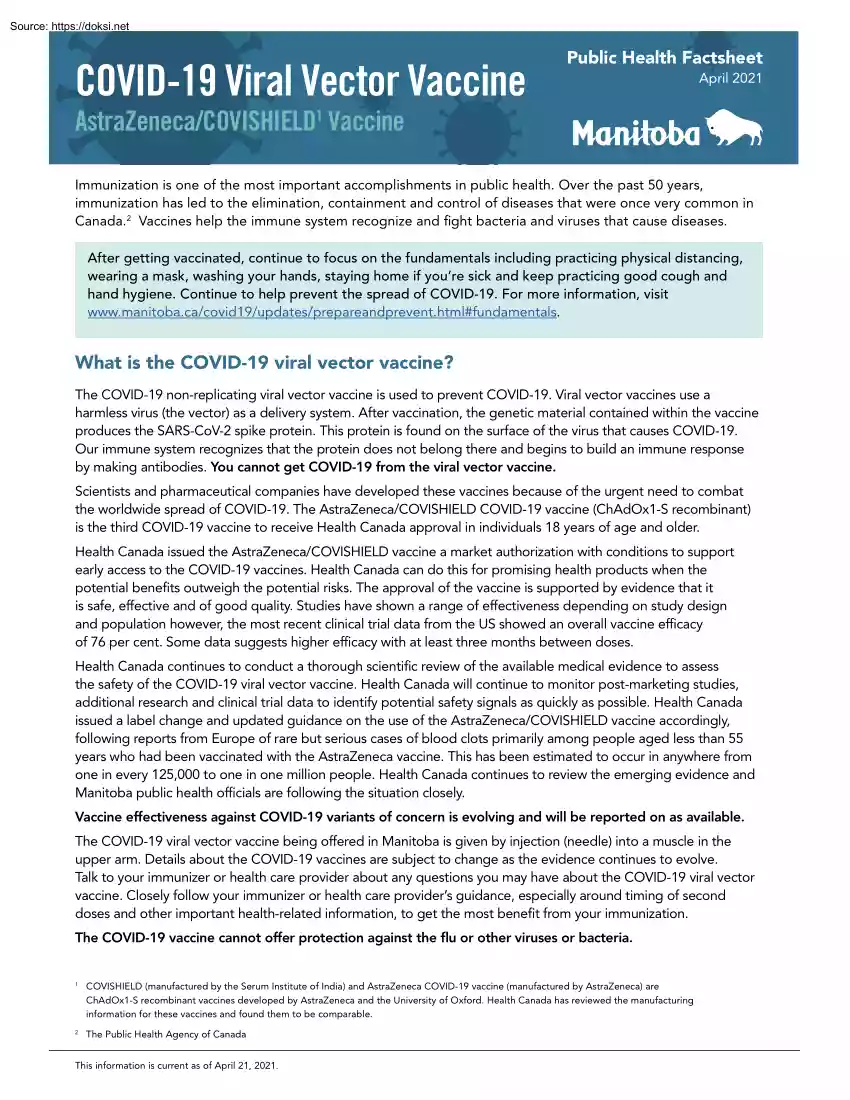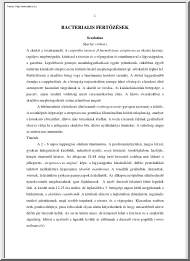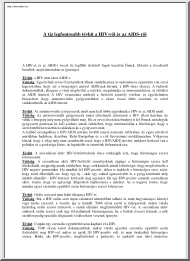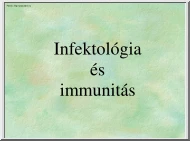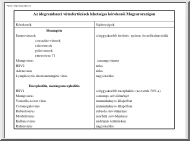Datasheet
Year, pagecount:2021, 5 page(s)
Language:English
Downloads:3
Uploaded:June 03, 2021
Size:659 KB
Institution:
-
Comments:
Attachment:-
Download in PDF:Please log in!
Comments
No comments yet. You can be the first!Most popular documents in this category
Content extract
COVID-19 Viral Vector Vaccine Public Health Factsheet April 2021 AstraZeneca/COVISHIELD1 Vaccine Immunization is one of the most important accomplishments in public health. Over the past 50 years, immunization has led to the elimination, containment and control of diseases that were once very common in Canada.2 Vaccines help the immune system recognize and fight bacteria and viruses that cause diseases After getting vaccinated, continue to focus on the fundamentals including practicing physical distancing, wearing a mask, washing your hands, staying home if you’re sick and keep practicing good cough and hand hygiene. Continue to help prevent the spread of COVID-19 For more information, visit www.manitobaca/covid19/updates/prepareandpreventhtml#fundamentals What is the COVID-19 viral vector vaccine? The COVID-19 non-replicating viral vector vaccine is used to prevent COVID-19. Viral vector vaccines use a harmless virus (the vector) as a delivery system. After vaccination, the
genetic material contained within the vaccine produces the SARS-CoV-2 spike protein. This protein is found on the surface of the virus that causes COVID-19 Our immune system recognizes that the protein does not belong there and begins to build an immune response by making antibodies. You cannot get COVID-19 from the viral vector vaccine Scientists and pharmaceutical companies have developed these vaccines because of the urgent need to combat the worldwide spread of COVID-19. The AstraZeneca/COVISHIELD COVID-19 vaccine (ChAdOx1-S recombinant) is the third COVID-19 vaccine to receive Health Canada approval in individuals 18 years of age and older. Health Canada issued the AstraZeneca/COVISHIELD vaccine a market authorization with conditions to support early access to the COVID-19 vaccines. Health Canada can do this for promising health products when the potential benefits outweigh the potential risks. The approval of the vaccine is supported by evidence that it is safe, effective and of
good quality. Studies have shown a range of effectiveness depending on study design and population however, the most recent clinical trial data from the US showed an overall vaccine efficacy of 76 per cent. Some data suggests higher efficacy with at least three months between doses Health Canada continues to conduct a thorough scientific review of the available medical evidence to assess the safety of the COVID-19 viral vector vaccine. Health Canada will continue to monitor post-marketing studies, additional research and clinical trial data to identify potential safety signals as quickly as possible. Health Canada issued a label change and updated guidance on the use of the AstraZeneca/COVISHIELD vaccine accordingly, following reports from Europe of rare but serious cases of blood clots primarily among people aged less than 55 years who had been vaccinated with the AstraZeneca vaccine. This has been estimated to occur in anywhere from one in every 125,000 to one in one million people.
Health Canada continues to review the emerging evidence and Manitoba public health officials are following the situation closely. Vaccine effectiveness against COVID-19 variants of concern is evolving and will be reported on as available. The COVID-19 viral vector vaccine being offered in Manitoba is given by injection (needle) into a muscle in the upper arm. Details about the COVID-19 vaccines are subject to change as the evidence continues to evolve Talk to your immunizer or health care provider about any questions you may have about the COVID-19 viral vector vaccine. Closely follow your immunizer or health care provider’s guidance, especially around timing of second doses and other important health-related information, to get the most benefit from your immunization. The COVID-19 vaccine cannot offer protection against the flu or other viruses or bacteria. 1 COVISHIELD (manufactured by the Serum Institute of India) and AstraZeneca COVID-19 vaccine (manufactured by AstraZeneca)
are ChAdOx1-S recombinant vaccines developed by AstraZeneca and the University of Oxford. Health Canada has reviewed the manufacturing information for these vaccines and found them to be comparable. 2 The Public Health Agency of Canada This information is current as of April 21, 2021. Why has the Manitoba government moved to delaying the second dose of COVID-19 vaccines? The National Advisory Committee on Immunization (NACI)3 has provided guidance to provinces and territories to extend the spacing between the first and second doses to four months. This decision is based on what public health officials are seeing in real-world conditions about the effectiveness of the vaccines currently authorized for use in Canada. These vaccines are providing a significant level of protection, meaning there is a clear advantage to getting vaccine to more people, sooner. This approach will allow more Manitobans to be immunized sooner. Who should get the COVID-19 viral vector vaccine?
COVID-19 vaccines will eventually be available for all Manitobans. There are multiple COVID-19 vaccines in various stages of development worldwide, with some already approved and available for public use. Each Health Canada-approved COVID-19 vaccine, particularly those using different technology (e.g, mRNA vaccines vs viral vector vaccines), will vary with their own indications for use While supplies are limited, Manitoba has identified the following priority populations to get a COVID-19 vaccine first, based on recommendations made by the NACI and working with public health experts across the country: • health care workers, focusing first on those who provide direct patient care • congregate living facility staff, such as those who work in shelters or group homes • congregate living facility residents, starting with licensed personal care homes • First Nation people • the general population, starting with older adults Health Canada authorized the use of
AstraZeneca/COVISHIELD in individuals 18 years of age and older on February 26, 2021. AstraZeneca/COVISHIELD is being offered to eligible individuals who would otherwise have to wait for the mRNA vaccine. Being vaccinated now with the viral vector vaccine will not affect future eligibility for another COVID-19 vaccine, if the evolving evidence supports re-vaccination at a later time. Eligibility criteria is subject to change as we learn more about the vaccines available and as supply increases; visit: www.manitobaca/covid19/vaccine/eligibility-criteriahtml for up-to-date eligibility criteria Individuals living with a medical condition (e.g, heart failure, liver disease, chronic kidney disease) can get the vaccine. If you are immunosuppressed due to disease or treatment, or, you have an autoimmune condition, see the appropriate fact sheet for information about the risks and benefits of immunization available at: www.manitobaca/covid19/vaccine/resourceshtml Talk to your immunizer or
health care provider if you have any questions about your medical conditions, or if you aren’t sure if you are immunosuppressed or have an autoimmune condition. Your immunizer can give you more information, based on what we know now from early clinical trial data and post-marketing studies. People who have gotten sick with COVID-19, and have recovered, may still benefit from getting the vaccine. Currently, there is limited data on the use of COVID-19 vaccines in people who have gotten sick with COVID-19 and recovered. In the context of limited vaccine supplies, NACI recommends waiting three months before getting immunized. Talk to your health care provider about the best time for you to get vaccinated 3 The National Advisory Committee on Immunization (NACI) makes recommendations for the use of vaccines currently or newly approved for use in people in Canada, including the COVID-19 vaccines. For more information, please visit
https://www.canadaca/en/public-health/services/immunization/national-advisory-committee-on-immunization-naci/ Who should NOT get the COVID-19 viral vector vaccine? There have been rare but serious reports of younger adults experiencing blood clots following immunization with the AstraZeneca vaccine first seen in Europe. This is being referred to by medical experts as, "Vaccine-Induced Pro-thrombotic Immune Thrombocytopenia (VIPIT)." Talk to your immunizer or health care provider BEFORE getting immunized: • if you have had a history of venous sinus thrombosis in the brain or a history of heparin-induced thrombocytopenia (HIT) and • about the risks and benefits of vaccination. People who have had their first dose of COVID-19 vaccine with the COVID-19 mRNA vaccine (Pfizer-BioNTech or Moderna), should not get their second dose with the viral vector vaccine. The COVID-19 viral vector vaccine should not be given to people who are allergic to an active substance, or any
ingredient of the vaccine, or if you have had a severe allergic reaction after the first dose of a viral vector vaccine. An allergic reaction can be life-threatening For information about any of the COVID-19 vaccine’s ingredients, please review the vaccine manufacturer’s product monograph, available at: www.manitobaca/vaccine or talk to your immunizer or health care provider Polysorbate 80 is an ingredient of the viral vector vaccine. It is a potential allergen known to cause possible allergic reactions, including serious reactions. Polysorbate 80 may be found in some medication preparations (e.g, vitamin oils, tablets, and anticancer agents) and cosmetics Individuals with polysorbate 80 allergies may also be allergic to polyethylene glycol (PEG), another potential allergen found in many products (e.g, bowel preparation products for colonoscopy, laxatives, cough syrup, cosmetics, contact lens care solutions, skin care products, and as an additive in some food or drinks). If you are
allergic to polysorbate 80 or PEG, speak with your health care provider before immunization. NACI recommends that COVID-19 vaccines should not be given at the same time as other (live or inactivated) vaccines. Wait 14 days after any other vaccine before receiving your COVID-19 vaccine After receiving a dose of COVID-19 vaccine, wait 28 days before receiving any other vaccine, unless a vaccine is required urgently, due to an exposure to a virus such as Hepatitis B. If you have a fever or any symptoms that could be due to COVID-19, you should wait to be vaccinated. Talk with your health care provider about your symptoms and getting a COVID-19 test. Your health care provider will advise you when you may be able to receive the vaccine. Possible side effects from the COVID-19 viral vector vaccine In general, the side effects observed during the clinical trials were similar to those of other vaccines. The side effects were generally mild or moderate, and went away a few days after
vaccination. They included pain, redness, itchiness, swelling and a warm feeling at the injection site, body chills, feeling tired and feverish, headache, muscle and joint pain, as well as nausea and vomiting. Over-the-counter medicines, such as acetaminophen (e.g, Tylenol®) or ibuprofen (eg, Advil®) may be considered to help manage these symptoms (like pain or fever, respectively), if they occur after vaccination. These are common side effects of vaccines and are not a risk to your health. Signs and symptoms of blood clots, a rare but serious possible reaction first found in Europe following AstraZeneca vaccination, include: shortness of breath, chest pain, leg swelling, persistent abdominal pain, neurological symptoms including sudden onset of severe or persistent worsening headaches or blurred vision and skin bruising (other than at the site of where the vaccine was given). If you experience any of these signs or symptoms within 20 days of being immunized with the
AstraZeneca/COVISHIELD vaccine, go to the nearest emergency department or health centre for immediate attention. Be sure to tell your doctors that you received the AstraZeneca/COVISHIELD vaccine and when you received it. For a full list of possible side effects, please review the vaccine manufacturer’s product monograph, which is available at: www.manitobaca/vaccine or speak with your immunizer or health care provider As with all vaccines, more serious side effects such as allergic reactions are possible. However, these are rare It is important to stay in the immunization clinic for 15 minutes after getting any vaccine in the unlikely event of a severe allergic reaction. You may need to stay in the clinic for 30 minutes if you have had a serious allergic reaction to a vaccine in the past or have a history of severe allergies to food, medicine, environmental agents or other known allergens. Symptoms of a severe allergic reaction can include hives, difficulty breathing, or swelling
of the throat, tongue or lips. This can happen up to an hour after you get vaccinated If this happens after you leave the immunization clinic, call 911 or go to the nearest emergency department or health centre for immediate attention. Report any serious or unexpected adverse reactions to a health care provider, or call Health Links – Info Santé at 204-788-8200 or 1-888-315-9257 (toll free). Preparing for your vaccination Be sure to follow the signs and instructions at the immunization clinic (e.g, stay two metres away from other people), and remember to stay home if you are sick. • Wear a short-sleeved shirt. • Be sure you have eaten regularly that day. • Bring and wear your mask. • Bring any personal identification required by the immunization clinic, such as your Manitoba Health Family Registration Card. After getting vaccinated, continue to focus on the fundamentals to help prevent the spread of COVID-19. For more information, visit:
www.manitobaca/covid19/updates/prepareandpreventhtml#fundamentals Your record of protection All immunizations, including the COVID-19 vaccine, are recorded on your immunization record in Manitoba’s immunization registry. This registry: • allows health care providers to find out which immunizations you (or the people you care for) have received or need to have. • may be used to produce immunization records or notify you or your health care provider if a particular immunization has been missed. • allows Manitoba Health and Seniors Care as well as public health officials, to monitor how well vaccines work in preventing disease. The Personal Health Information Act protects your information and/or the information about any people you provide care for. You can choose to have this personal health information hidden from health care providers For additional information, please contact your local public health office or talk to a health care provider. An official Government of Manitoba
COVID-19 Immunization Record can be obtained online at: https://sharedhealthmb.ca/covid19/test-results/ You will need your Manitoba Health Family Registration Card to register and access your record. If you need information on the other immunizations that you or the people you care for have received, contact your health care provider, or contact your local public health office for a copy of your immunization records. For a listing of public health offices, visit: www.manitobaca/health/publichealth/officeshtml For more information For more information about COVID-19 or the COVID-19 vaccines, talk to your health care provider. You can also call Health Links – Info Santé in Winnipeg at 204-788-8200 or 1-888-315-9257 (toll free in Manitoba). Or visit: Manitoba Government: www.manitobaca/covid19/indexhtml Government of Canada: www.canadaca/en/public-health/services/diseases/coronavirus-disease-covid-19html
genetic material contained within the vaccine produces the SARS-CoV-2 spike protein. This protein is found on the surface of the virus that causes COVID-19 Our immune system recognizes that the protein does not belong there and begins to build an immune response by making antibodies. You cannot get COVID-19 from the viral vector vaccine Scientists and pharmaceutical companies have developed these vaccines because of the urgent need to combat the worldwide spread of COVID-19. The AstraZeneca/COVISHIELD COVID-19 vaccine (ChAdOx1-S recombinant) is the third COVID-19 vaccine to receive Health Canada approval in individuals 18 years of age and older. Health Canada issued the AstraZeneca/COVISHIELD vaccine a market authorization with conditions to support early access to the COVID-19 vaccines. Health Canada can do this for promising health products when the potential benefits outweigh the potential risks. The approval of the vaccine is supported by evidence that it is safe, effective and of
good quality. Studies have shown a range of effectiveness depending on study design and population however, the most recent clinical trial data from the US showed an overall vaccine efficacy of 76 per cent. Some data suggests higher efficacy with at least three months between doses Health Canada continues to conduct a thorough scientific review of the available medical evidence to assess the safety of the COVID-19 viral vector vaccine. Health Canada will continue to monitor post-marketing studies, additional research and clinical trial data to identify potential safety signals as quickly as possible. Health Canada issued a label change and updated guidance on the use of the AstraZeneca/COVISHIELD vaccine accordingly, following reports from Europe of rare but serious cases of blood clots primarily among people aged less than 55 years who had been vaccinated with the AstraZeneca vaccine. This has been estimated to occur in anywhere from one in every 125,000 to one in one million people.
Health Canada continues to review the emerging evidence and Manitoba public health officials are following the situation closely. Vaccine effectiveness against COVID-19 variants of concern is evolving and will be reported on as available. The COVID-19 viral vector vaccine being offered in Manitoba is given by injection (needle) into a muscle in the upper arm. Details about the COVID-19 vaccines are subject to change as the evidence continues to evolve Talk to your immunizer or health care provider about any questions you may have about the COVID-19 viral vector vaccine. Closely follow your immunizer or health care provider’s guidance, especially around timing of second doses and other important health-related information, to get the most benefit from your immunization. The COVID-19 vaccine cannot offer protection against the flu or other viruses or bacteria. 1 COVISHIELD (manufactured by the Serum Institute of India) and AstraZeneca COVID-19 vaccine (manufactured by AstraZeneca)
are ChAdOx1-S recombinant vaccines developed by AstraZeneca and the University of Oxford. Health Canada has reviewed the manufacturing information for these vaccines and found them to be comparable. 2 The Public Health Agency of Canada This information is current as of April 21, 2021. Why has the Manitoba government moved to delaying the second dose of COVID-19 vaccines? The National Advisory Committee on Immunization (NACI)3 has provided guidance to provinces and territories to extend the spacing between the first and second doses to four months. This decision is based on what public health officials are seeing in real-world conditions about the effectiveness of the vaccines currently authorized for use in Canada. These vaccines are providing a significant level of protection, meaning there is a clear advantage to getting vaccine to more people, sooner. This approach will allow more Manitobans to be immunized sooner. Who should get the COVID-19 viral vector vaccine?
COVID-19 vaccines will eventually be available for all Manitobans. There are multiple COVID-19 vaccines in various stages of development worldwide, with some already approved and available for public use. Each Health Canada-approved COVID-19 vaccine, particularly those using different technology (e.g, mRNA vaccines vs viral vector vaccines), will vary with their own indications for use While supplies are limited, Manitoba has identified the following priority populations to get a COVID-19 vaccine first, based on recommendations made by the NACI and working with public health experts across the country: • health care workers, focusing first on those who provide direct patient care • congregate living facility staff, such as those who work in shelters or group homes • congregate living facility residents, starting with licensed personal care homes • First Nation people • the general population, starting with older adults Health Canada authorized the use of
AstraZeneca/COVISHIELD in individuals 18 years of age and older on February 26, 2021. AstraZeneca/COVISHIELD is being offered to eligible individuals who would otherwise have to wait for the mRNA vaccine. Being vaccinated now with the viral vector vaccine will not affect future eligibility for another COVID-19 vaccine, if the evolving evidence supports re-vaccination at a later time. Eligibility criteria is subject to change as we learn more about the vaccines available and as supply increases; visit: www.manitobaca/covid19/vaccine/eligibility-criteriahtml for up-to-date eligibility criteria Individuals living with a medical condition (e.g, heart failure, liver disease, chronic kidney disease) can get the vaccine. If you are immunosuppressed due to disease or treatment, or, you have an autoimmune condition, see the appropriate fact sheet for information about the risks and benefits of immunization available at: www.manitobaca/covid19/vaccine/resourceshtml Talk to your immunizer or
health care provider if you have any questions about your medical conditions, or if you aren’t sure if you are immunosuppressed or have an autoimmune condition. Your immunizer can give you more information, based on what we know now from early clinical trial data and post-marketing studies. People who have gotten sick with COVID-19, and have recovered, may still benefit from getting the vaccine. Currently, there is limited data on the use of COVID-19 vaccines in people who have gotten sick with COVID-19 and recovered. In the context of limited vaccine supplies, NACI recommends waiting three months before getting immunized. Talk to your health care provider about the best time for you to get vaccinated 3 The National Advisory Committee on Immunization (NACI) makes recommendations for the use of vaccines currently or newly approved for use in people in Canada, including the COVID-19 vaccines. For more information, please visit
https://www.canadaca/en/public-health/services/immunization/national-advisory-committee-on-immunization-naci/ Who should NOT get the COVID-19 viral vector vaccine? There have been rare but serious reports of younger adults experiencing blood clots following immunization with the AstraZeneca vaccine first seen in Europe. This is being referred to by medical experts as, "Vaccine-Induced Pro-thrombotic Immune Thrombocytopenia (VIPIT)." Talk to your immunizer or health care provider BEFORE getting immunized: • if you have had a history of venous sinus thrombosis in the brain or a history of heparin-induced thrombocytopenia (HIT) and • about the risks and benefits of vaccination. People who have had their first dose of COVID-19 vaccine with the COVID-19 mRNA vaccine (Pfizer-BioNTech or Moderna), should not get their second dose with the viral vector vaccine. The COVID-19 viral vector vaccine should not be given to people who are allergic to an active substance, or any
ingredient of the vaccine, or if you have had a severe allergic reaction after the first dose of a viral vector vaccine. An allergic reaction can be life-threatening For information about any of the COVID-19 vaccine’s ingredients, please review the vaccine manufacturer’s product monograph, available at: www.manitobaca/vaccine or talk to your immunizer or health care provider Polysorbate 80 is an ingredient of the viral vector vaccine. It is a potential allergen known to cause possible allergic reactions, including serious reactions. Polysorbate 80 may be found in some medication preparations (e.g, vitamin oils, tablets, and anticancer agents) and cosmetics Individuals with polysorbate 80 allergies may also be allergic to polyethylene glycol (PEG), another potential allergen found in many products (e.g, bowel preparation products for colonoscopy, laxatives, cough syrup, cosmetics, contact lens care solutions, skin care products, and as an additive in some food or drinks). If you are
allergic to polysorbate 80 or PEG, speak with your health care provider before immunization. NACI recommends that COVID-19 vaccines should not be given at the same time as other (live or inactivated) vaccines. Wait 14 days after any other vaccine before receiving your COVID-19 vaccine After receiving a dose of COVID-19 vaccine, wait 28 days before receiving any other vaccine, unless a vaccine is required urgently, due to an exposure to a virus such as Hepatitis B. If you have a fever or any symptoms that could be due to COVID-19, you should wait to be vaccinated. Talk with your health care provider about your symptoms and getting a COVID-19 test. Your health care provider will advise you when you may be able to receive the vaccine. Possible side effects from the COVID-19 viral vector vaccine In general, the side effects observed during the clinical trials were similar to those of other vaccines. The side effects were generally mild or moderate, and went away a few days after
vaccination. They included pain, redness, itchiness, swelling and a warm feeling at the injection site, body chills, feeling tired and feverish, headache, muscle and joint pain, as well as nausea and vomiting. Over-the-counter medicines, such as acetaminophen (e.g, Tylenol®) or ibuprofen (eg, Advil®) may be considered to help manage these symptoms (like pain or fever, respectively), if they occur after vaccination. These are common side effects of vaccines and are not a risk to your health. Signs and symptoms of blood clots, a rare but serious possible reaction first found in Europe following AstraZeneca vaccination, include: shortness of breath, chest pain, leg swelling, persistent abdominal pain, neurological symptoms including sudden onset of severe or persistent worsening headaches or blurred vision and skin bruising (other than at the site of where the vaccine was given). If you experience any of these signs or symptoms within 20 days of being immunized with the
AstraZeneca/COVISHIELD vaccine, go to the nearest emergency department or health centre for immediate attention. Be sure to tell your doctors that you received the AstraZeneca/COVISHIELD vaccine and when you received it. For a full list of possible side effects, please review the vaccine manufacturer’s product monograph, which is available at: www.manitobaca/vaccine or speak with your immunizer or health care provider As with all vaccines, more serious side effects such as allergic reactions are possible. However, these are rare It is important to stay in the immunization clinic for 15 minutes after getting any vaccine in the unlikely event of a severe allergic reaction. You may need to stay in the clinic for 30 minutes if you have had a serious allergic reaction to a vaccine in the past or have a history of severe allergies to food, medicine, environmental agents or other known allergens. Symptoms of a severe allergic reaction can include hives, difficulty breathing, or swelling
of the throat, tongue or lips. This can happen up to an hour after you get vaccinated If this happens after you leave the immunization clinic, call 911 or go to the nearest emergency department or health centre for immediate attention. Report any serious or unexpected adverse reactions to a health care provider, or call Health Links – Info Santé at 204-788-8200 or 1-888-315-9257 (toll free). Preparing for your vaccination Be sure to follow the signs and instructions at the immunization clinic (e.g, stay two metres away from other people), and remember to stay home if you are sick. • Wear a short-sleeved shirt. • Be sure you have eaten regularly that day. • Bring and wear your mask. • Bring any personal identification required by the immunization clinic, such as your Manitoba Health Family Registration Card. After getting vaccinated, continue to focus on the fundamentals to help prevent the spread of COVID-19. For more information, visit:
www.manitobaca/covid19/updates/prepareandpreventhtml#fundamentals Your record of protection All immunizations, including the COVID-19 vaccine, are recorded on your immunization record in Manitoba’s immunization registry. This registry: • allows health care providers to find out which immunizations you (or the people you care for) have received or need to have. • may be used to produce immunization records or notify you or your health care provider if a particular immunization has been missed. • allows Manitoba Health and Seniors Care as well as public health officials, to monitor how well vaccines work in preventing disease. The Personal Health Information Act protects your information and/or the information about any people you provide care for. You can choose to have this personal health information hidden from health care providers For additional information, please contact your local public health office or talk to a health care provider. An official Government of Manitoba
COVID-19 Immunization Record can be obtained online at: https://sharedhealthmb.ca/covid19/test-results/ You will need your Manitoba Health Family Registration Card to register and access your record. If you need information on the other immunizations that you or the people you care for have received, contact your health care provider, or contact your local public health office for a copy of your immunization records. For a listing of public health offices, visit: www.manitobaca/health/publichealth/officeshtml For more information For more information about COVID-19 or the COVID-19 vaccines, talk to your health care provider. You can also call Health Links – Info Santé in Winnipeg at 204-788-8200 or 1-888-315-9257 (toll free in Manitoba). Or visit: Manitoba Government: www.manitobaca/covid19/indexhtml Government of Canada: www.canadaca/en/public-health/services/diseases/coronavirus-disease-covid-19html
